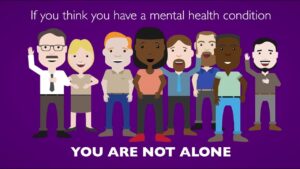If you are looking for ways on how to deal with mental health problems, read on. Here are some tips on getting a proper diagnosis, treatment options, support groups, and medication. It is important to get a proper diagnosis before you can start treatment. You can also use a resource list below to find resources that may help. These resources will help you understand what you are going through and can help you make the right decision.
Getting an accurate diagnosis
Getting an accurate diagnosis when dealing with mental illnesses is of utmost importance. This is because it will allow you to access special services for your condition. A wrong diagnosis can have disastrous consequences. For example, you might be given a prescription for a medication for a condition that you actually do not have. The wrong prescription could even lead to a relapse. The benefits of getting an accurate diagnosis are manifold.
The first step in getting an accurate diagnosis is to understand what is causing your symptoms. Mental illnesses take a long time to diagnose. The mental health professional must analyze the patterns of your symptoms and look for clues based on these patterns. Depending on your medical history and the symptoms you experience, it may take many appointments before you get a proper diagnosis. The extra time may also contribute to the physical health problems associated with your mental illness.
Once the professional makes an accurate diagnosis, they can proceed with a proper treatment. The treatment process can be made easier if you are armed with the right information about your condition. An accurate diagnosis will allow you to access specialized health care programs and providers that can help you. However, a diagnosis is just a starting point. To effectively address your mental illness, you must learn as much as you can about it. Once you understand your condition, you can begin to rebuild your life.
For cases of severe mental illness, a team approach is advisable. A primary care provider can help you deal with mild mental illnesses like anxiety and depression. More serious cases like schizophrenia require a team approach. However, remember that psychiatric medications do not cure the condition. They can help your symptoms and make other treatments more effective. The best medication for you will depend on your particular situation and the response of your body.
People often find it comforting to get a label that describes their symptoms. When they know the cause of their symptoms, it helps them get rid of the self-blame that often follows. Additionally, knowing your diagnosis can improve the communication between health care providers and make it easier to receive treatments and support groups. This will lead to improved recovery and a better life. However, understanding your diagnosis is only the beginning.
Treatment options
Behavioral health disorders are medical conditions that interfere with one’s behavior, thoughts, and emotions. They affect as many as 20 percent of the U.S. population and are the most common cause of death among Americans ages 15 to 34. People with these problems generally require a combination of talk therapy and medication to address their symptoms. It is important to note that no one is at fault for developing such disorders; it is a medical condition that requires treatment.
Treatment options for mental illnesses include group therapy, medication, and counseling. Outpatient therapy is usually provided in a doctor’s office and does not involve an overnight stay. Partial hospitalization is another option. It usually involves treatment over several days. Regardless of the treatment option, it is important to understand that the most effective approach will depend on the individual’s situation and body’s response to treatment. To understand your treatment options, begin by defining your goals.
Some treatments are based on research and can be used to help people cope with the symptoms of mental health problems. For instance, herbal remedies and brain stimulation may help some people deal with depression or anxiety. However, these methods can negatively impact other medications, and they should only be used after consulting with a mental health professional. When medications and therapy fail, you may need to seek 24-hour care in a psychiatric hospital. Depending on the severity of your mental illness, you may benefit from intensive outpatient treatment or even a residential treatment program.
Psychotherapy, also known as talk therapy, is a common treatment for mental health problems. It involves talking with a licensed mental health care professional to modify troubling thoughts. Typically, individual psychotherapy involves one person with a therapist, while group psychotherapy consists of two to four patients sharing experiences and learning from each other. If you choose to undergo group psychotherapy, you may be more comfortable discussing your symptoms with a larger group of people.
In general, treatment for mental illness aims to improve the symptoms of the condition and improve a person’s quality of life. The goal is not to cure the problem, but to help the patient develop strategies for managing their symptoms and creating a fulfilling life despite the mental health issue. So if you are experiencing any of the symptoms of mental illness, you should consult with a mental health professional immediately. You might also want to consider psychotherapy if you feel depressed, anxious, or irritable.
Support groups
When setting up a support group, it’s important to establish clear rules and a discussion format. Members should feel comfortable discussing their personal experiences, so they should know how to keep their privacy and respect the privacy of others. If the group doesn’t follow these rules, leave and find another group. While support groups may seem like an easy way to cope with mental health problems, they should never substitute for proper mental health care.
Although most support groups don’t advertise online, talking to a mental health professional can lead you to a supportive group. Although doctors are bound by confidentiality, it’s unlikely they will recommend one. Likewise, support groups can be difficult to find. Different personalities in a group can create a conflicting environment for members. So, it’s advisable to talk to several people before making a decision. Support groups for mental health problems can help you build your self-awareness and improve your coping skills.
There are several types of support groups. Support groups for mental health problems are usually formed around a common mental health issue. They fill a gap between medical care and the emotional support from loved ones. By offering emotional and practical support, members can work through their challenges together in a safe and nonjudgmental environment. Some groups even have members with similar experiences to share their own. In these groups, the support you receive is invaluable, and it helps you overcome any challenges you may face.
In addition to peer-to-peer support groups, there are also organizations specifically for LGBT people. For example, PFLAG is an organization that helps LGBTQ people and their families get together. These groups meet on the second and fourth Thursday of each month and include topics such as anxiety, depression, and PTSD. There are also support groups for people with co-occurring disorders like schizophrenia. It is recommended to check out the local chapters of these organizations to learn more about the support groups for people with these disorders.
In addition to peer-to-peer support groups, the National Alliance on Mental Illness (NAMI) also offers a training program for family members. Family-to-family training is a free twelve-session educational program that’s led by people who have experienced similar problems. It is a proven program and is taught by trained family members. For more information about mental illness, check out NAMI’s website.
Medication
Medication for mental health problems is an option for some people, but there are many risks and side effects. Many of the drugs used to treat mental illness in adults are also effective for children. While they can cause side effects in children, doctors adjust the dosage for children and monitor them more closely than adults. There have been some cases where antidepressants have increased the risk of suicidal behavior in children. While medications can help treat mental illnesses, they cannot cure them. Instead, they can alleviate their symptoms, which in turn can help other treatments such as therapy and counseling.
Medication for mental health problems can help a person get through a crisis, but it can also be used for long-term treatment. It can help with the symptoms of mental illnesses, and reduce or even eliminate them. Generally, there are four main types of mental health medications. Trade names are given by the manufacturer, while generic names refer to the active ingredients in the drug. Other drugs are also known by generic names, and are called by the family of chemicals in which they belong.
While medication can be very helpful for some people, it is not the best option for everyone. Medication can have long-term negative effects, so it is important to find a complementary therapy that will help you cope with your condition. The main benefits of medication are immediate relief and reduced side effects. However, the risks involved with these drugs are not worth the risks. If you’re not sure about the drugs you’re taking, consult with a mental health professional before taking them.
Despite the benefits of medication for mental health problems, research on its effects is limited by a lack of adequate data sources. Data on the prevalence of specific disorders and the use of medications for these problems are limited in the United States. In 2013, the DSM-5 was published with revised diagnostic criteria. In addition, changes in policies may affect access to care. The Patient Protection and Affordable Care Act is one such change. There are a number of reasons why medication is not the only option for treating mental health problems.


